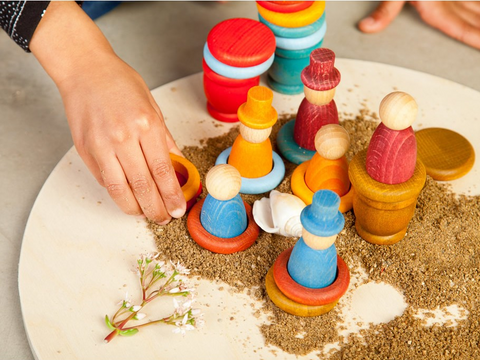We all want beautiful childhoods for our little ones, full of fun-filled moments and skill-building experiences that will help them thrive. There's so much pressure to create an environment that is safe, secure, and in which they are comfortable to be themselves. And while we continue to change for the duration of our lives, most psychologists will agree that childhood and our upbringing has an enormous impact on the shape of our adult selves.
In a society when it seems like there is an app or toy for everything, we lose the opportunity to expose our children to imaginative and symbolic play. One where they are the "masters" of the situation, and they can assign roles to different objects, creating a story behind it.
So What Exactly is Imaginative Play?
Well for the most part, it's a lot of pretending! Pretending that a box is a train wagon, or that a block is a phone. It's assigning meaning to something so that they can play out a behavior or action that they have witnessed in the past.
Why is Symbolic or Imaginative Play Important to Child Development?
Social Skills
While exposing your child to others can obviously stimulate social and emotional skills, imaginative play allows for kids to put themselves in roles that they don't necessarily perform on an everyday basis. An example is nurturing a toy dolly and pretending that he or she is a parent, or playing out scenarios with multiple toys where there might be a conflict of interests. Symbolic play introduces children to empathy, the ability to "be in someone else's shoes" for a bit rather than see the world through an ego-centric perspective.
Cognitive Skills
Even as adults, we function in a world where objects or symbols symbolize greater ideas or things. Examples are money, flags, even the colours on traffic lights. Understanding that there can be items that represent abstract concepts is something that will be useful for their entire lives and they will just build on. Imaginative play also gives children the chance to play through certain scenarios or problems in a safe place to make those real life connections.
Motor Skills
Acting out "pretend" play takes a lot of movement- whether that's with the entire body in imitating a flying superhero, or minute focused movements to move small objects into the right position. It's a great juxtaposition of motor and cognitive skills, keeping kids moving and thinking rather than being couch potatoes.
What Can We Do to Induce Imaginative Play

Really, kids are naturally curious and open to symbolic play, it's part of their nature. Our role is to keep it from being suppressed by alternative activities that don't provide the same level of social, cognitive, and motor stimulation. There are many toys out there, like the Rainbow from Grimm's Toys, or the "peg people" from Goose Grease and Grapat Toys. The latter that are customizable to any role the child gives them. They can draw on different outfits, accessories, making them the perfect addition to a minimalist child's toy box. The rainbow is also versatile, as it can be stacked as a rainbow or become a cradle for dolls, a fence for animals, a tunnel or bridge for vehicles, or a house for dwarfs.
Just a few small pieces can become a plethora of different environments and characters. As they are wooden and non-toxic, they are toys that everyone can feel good about giving and getting.
images: (1) Grapat Toys (2) Goose Grease Toys

